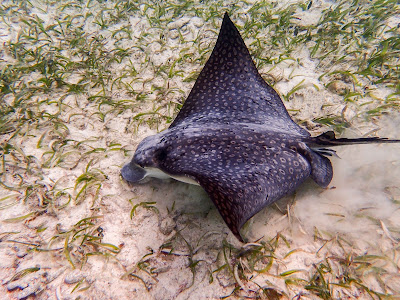Monday, January 9th, 2017
San Pedro, Ambergis Caye, Belize
Day #6: A 4 Snorkel Day!
Today was the most epic day of our trip so far! We boarded Goliath under windy conditions (again, far from ideal, due to a northern storm that created strong winds, waves, and current) and headed to the Hol Chan Marine Protected Area. This is Belize's oldest and best managed marine park. It has been a "no touch" zone for nearly 30 years and has thrived.
Our first stop was a spot named Shark Ray Alley. Read that name again. How awesome is that? Who wouldn't want to go to Shark Ray Alley? As we slipped into the water, the boat provided chum which attracted about 6 nurse sharks, 10 southern and horseshoe sting rays, and schools of large fish such as horse-eyed jack and blue tang:
The students swam with the sharks and rays, and took turns approaching them closely for photos:
We stayed in the water for over an hour, closely observing all of the fascinating marine life. Several students said that this was their favorite spot of the trip thus far.
When everyone had their fill of charismatic megafauna, we headed to the main part of the preserve. Hol Chan means "little channel" and marks a spot where the ancient Mayans would navigate to the island. It has a deep-water channel and fish that are larger, more abundant, and more varied than any other site in Belize. We were lead on a guided tour that allowed us to observe and interact with a wide variety of marine life:
Highlights included an underwater arch that the braver students could swim through, large schools of grunts, and several green moray eels:
From there, we headed to an unprotected reef to finish our research. Students found two more stands of coral and cataloged them for all species present. We returned to TREC and collated our data. That night (starting around 9PM - that's dedication!) we had a big lab meeting to finalize all of the data gathered and to discuss the format of the lab report.
We returned from the water at about 4PM and had just one hour to dry off, gather our wits, and head back out on to the water for our night snorkel. We sat on Goliath as the sun set behind the island:
After an extensive briefing from Ken about what we were likely to encounter, the sun set, we donned our snorkel gear, were issues underwater dive lights, and were led in 2 groups on a tour of Tuffy Reef at night:
Diving at night is a very interesting and unique experience! Most students expressed anxiety (and a few downright fear) about the experience, and that is warranted. It is very disconcerting to be in such an alien landscape with only a thin beam of light to illuminate a small portal of view. One can't help wonder what lies just beyond that thin beam:
Despite the unquestioned freakiness of the whole thing, every student stepped outside of their comfort zone, put aside whatever fear was nibbling at the consciousness, and pushed their limits.
We saw a lot of interesting life at night, including corals, urchins, various fish (such as the sleeping parrotfish below), eels, and squid.
But the star of the show, the organism that everyone came to see, was the octopus. The octopus of Tuffy Reef are unusually friendly. The seem to enjoy being handled and carried around. The octopus could ink, bite, and/or flee at any moment, but it chose to stay with our group for about 30 minutes, switching from hand to hand and gamely posing for photos. The octopus itself was very soft and slimy, almost hard to keep in your hand, but with very powerful suckers that could latch on to many different objects at once:
We returned to TREC around 8PM for a late dinner, lab meeting, and then early bed. Everyone was pretty exhausted from the day.
Tomorrow is our last day on the island. I will try my best to post the blog on Tuesday night before we leave, but the Internet can be very spotty. I have been waking up an hour before everyone else in order to access the Internet when it is least used - that's why the posts have been coming the morning after.
Thanks for reading! Everyone remains well. We have a few minor illnesses (sea sickness, water-in-the-ear, etc.) and some burns, scrapes, and bites, but nothing that required any attention beyond what our trip medic Megan could provide out of our very well stocked first aid kit.
Bye for now!
- Prof. Eric J. Simon ejs@ericjsimon.com
























What an amazing trip for you all! I loved the part about getting out of comfort zones by trying something(s) that may be a bit scary or unfamiliar! Way to go. I wish you safe travels back to NH, and look forward to hearing much more about the trip as I see some of you on campus.
ReplyDeleteThis last comment posted by Mary Ellen Alger
DeleteHas the medic kept herself injury free? Can't wait to see your pictures Meg!
ReplyDeleteLove, Mom